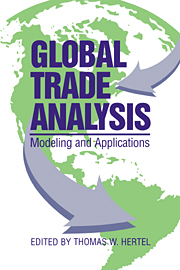

Hubbard, L. J. 1995. General equilibrium analysis of the CAP using the GTAP model. Oxford Agrarian Studies, Vol. 23, Issue. 2, p. 163.
Lewis, Jeffrey D. Robinson, Sherman and Wang, Zhi 1995. Beyond the Uruguay Round: The implications of an Asian free trade area. China Economic Review, Vol. 6, Issue. 1, p. 35.
Rimmer, Maureen T. and Powell, Alan A. 1996. An implicitly additive demand system. Applied Economics, Vol. 28, Issue. 12, p. 1613.
Harrison, Glenn W. Rutherford, Thomas F. and Tarr, David G. 1997. Quantifying the Uruguay Round. The Economic Journal, Vol. 107, Issue. 444, p. 1405.
Petri, Peter A. 1997. Foreign Direct Investment in a Computable General Equilibrium Framework. SSRN Electronic Journal,
Bollen, J.C. and Gielen, A.M. 1998. Economic Impacts of Multilateral Emission Reduction Policies. SSRN Electronic Journal ,
Jiang, Kejun Masui, Toshihiko Morita, Tsuneyuki and Matsuoka, Yuzuru 1999. Long-term emission scenarios for China. Environmental Economics and Policy Studies, Vol. 2, Issue. 4, p. 267.
Kainuma, Mikiko Matsuoka, Yuzuru and Morita, Tsuneyuki 1999. Analysis of Post-Kyoto Scenarios: The Asian-Pacific Integrated Model. The Energy Journal, Vol. 20, Issue. 1_suppl, p. 207.
Bernstein, Paul M. Montgomery, W.David and Rutherford, Thomas F. 1999. Global impacts of the Kyoto agreement: results from the MS-MRT model. Resource and Energy Economics, Vol. 21, Issue. 3-4, p. 375.
Paltsev, Sergey V. 2001. The Kyoto Protocol: Regional and Sectoral Contributions to the Carbon Leakage. The Energy Journal, Vol. 22, Issue. 4, p. 53.
Francois, Joseph 2001. Economic Impact of EU Membership on Entrants. p. 73.Siriwardana, Mahinda 2001. Looking beyond SAARC: some trade liberalisation options for Sri Lanka. Asian Studies Review, Vol. 25, Issue. 4, p. 453.
Boussard, Jean-Marc 2002. Agriculture and The World Trade Organisation. p. 241.Babiker, Mustafa H Jacoby, Henry D Reilly, John M and Reiner, David M 2002. The evolution of a climate regime: Kyoto to Marrakech and beyond. Environmental Science & Policy, Vol. 5, Issue. 3, p. 195.
Anderson, Kym Norman, David and Wittwer, Glyn 2002. Globalization and the World's Wine Markets: Overview. SSRN Electronic Journal ,
2002. World Economic Outlook, September 2002: Trade and Finance.Morita, Tsuneyuki Jiang, Kejun Masui, Toshihiko Matsuoka, Yuzuru and Rana, Ashish 2003. Climate Policy Assessment. p. 17.
Anderson, Kym Norman, David and Wittwer, Glyn 2003. Globalisation of the World's Wine Markets. The World Economy, Vol. 26, Issue. 5, p. 659.
Harasawa, Hideo Matsuoka, Yuzuru Takahashi, Kiyoshi Hijioka, Yasuaki Shimada, Yoko Munesue, Yosuke and Lal, Murari 2003. Climate Policy Assessment. p. 37.
Daudin, Guillaume 2003. Tous unis contre le protectionnisme des pays du Nord ?. Revue de l'OFCE, Vol. n o 84, Issue. 1, p. 95.
Edited by Thomas W. Hertel , Purdue University, Indiana Publisher: Cambridge University Press Online publication date: June 2012 Print publication year: 1996 Online ISBN: 9781139174688 Digital access for individuals (PDF download and/or read online) Added to cart Digital access for individuals (PDF download and/or read online)This book, drawn from the Global Trade Analysis Project (GTAP), aims to help readers conduct quantitative analysis of international trade issues in an economy-wide framework. In addition to providing a succinct introduction to the GTAP modelling framework and data base, this book contains seven of the most refined GTAP applications undertaken to date, covering topics ranging from trade policy to the global implications of environmental policies, factor accumulation and technological change. The authors of the applications are representative of the broader group of GTAP users. Some are academics, while others are professional economists in national and international agencies. All of their studies can be independently replicated by the reader through accessing software and files via the Internet. Readers can also explore the sensitivity of results to varying assumptions and use the applications to launch independent research projects.
To save content items to your account, please confirm that you agree to abide by our usage policies. If this is the first time you use this feature, you will be asked to authorise Cambridge Core to connect with your account. Find out more about saving content to .
To save content items to your Kindle, first ensure coreplatform@cambridge.org is added to your Approved Personal Document E-mail List under your Personal Document Settings on the Manage Your Content and Devices page of your Amazon account. Then enter the ‘name’ part of your Kindle email address below. Find out more about saving to your Kindle. Note you can select to save to either the @free.kindle.com or @kindle.com variations. ‘@free.kindle.com’ emails are free but can only be saved to your device when it is connected to wi-fi. ‘@kindle.com’ emails can be delivered even when you are not connected to wi-fi, but note that service fees apply. Find out more about the Kindle Personal Document Service.